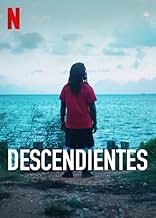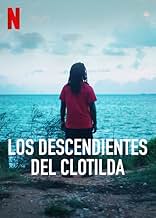VALUTAZIONE IMDb
7,1/10
1534
LA TUA VALUTAZIONE
I discendenti degli schiavi africani giunti in Alabama nel 1860 cercano giustizia e conforto dopo il rinvenimento dei resti della nave che aveva trasportato i loro antenati.I discendenti degli schiavi africani giunti in Alabama nel 1860 cercano giustizia e conforto dopo il rinvenimento dei resti della nave che aveva trasportato i loro antenati.I discendenti degli schiavi africani giunti in Alabama nel 1860 cercano giustizia e conforto dopo il rinvenimento dei resti della nave che aveva trasportato i loro antenati.
- Premi
- 7 vittorie e 24 candidature totali
Recensioni in evidenza
Slavery was one of the most important, and most disgraceful, parts of US history. Most of the focus on it emphasizes the plantations, the whipping of the enslaved African-Americans, and the Underground Railroad. A lesser known part is the slave trade itself. Outlawed in 1808, it continued in secret. The last ship to bring kidnapped Africans to the United States was the Clotilda, which docked in Mobile, Alabama, before getting sunk to hide its violation of the ban on slave-trading.
Margaret Brown's "Descendant" focuses on this, as well as the descendants of the enslaved people on the Alabama coast. It's a fascinating look at the aftermath of slavery, and how the descendants of the slaveowners are the biggest landholders in the area. Not to mention the chemical refineries dumping all sorts of toxins.
This is not a documentary that you'll forget anytime soon. I recommend it.
Margaret Brown's "Descendant" focuses on this, as well as the descendants of the enslaved people on the Alabama coast. It's a fascinating look at the aftermath of slavery, and how the descendants of the slaveowners are the biggest landholders in the area. Not to mention the chemical refineries dumping all sorts of toxins.
This is not a documentary that you'll forget anytime soon. I recommend it.
This is truly, deeply, sincerely an important piece of US History and an amazing story. The Clotilda and Africatown are remarkable and should be revered. The Clotilda is an extremely rare find that should be a National Monument. But of course - this represents a lot more than just the story of a ship!
I live in Mobile. I know these places! There have been a couple of documentaries now, about the Clotilda - and I have been excited to see them both; however, unfortunately - I don't think anyone has quite hit the mark yet when it comes to telling and presenting this story with the impact it deserves, but this wasn't bad - I enjoyed it - the story and the people are incredible - but I'm still waiting for a Clotilda show that tells it all with the passion and excitement to do this justice.
I live in Mobile. I know these places! There have been a couple of documentaries now, about the Clotilda - and I have been excited to see them both; however, unfortunately - I don't think anyone has quite hit the mark yet when it comes to telling and presenting this story with the impact it deserves, but this wasn't bad - I enjoyed it - the story and the people are incredible - but I'm still waiting for a Clotilda show that tells it all with the passion and excitement to do this justice.
If a person knew very little about slavery and the slave trade, this documentary would be a great shock and revelation. Since my earliest student days, however, the slave trade between Africa and the "Americas" stood high profile with me. It still does.
By focusing on the voyage of the "Clotilda", it being the last or one of the last slavers, and the descendance of its human cargo, it manages to cover the utterly dismal topic sufficiently. Grinning white people in suits referring to the reconstructive drawing of the "Clotilda" as "Wonderful" have no place in this story. This story belongs to African Americans, and how they were so late in history, abducted to the Americas by greedy white men.
These same men, and they were men, who now hold all the money and land from this outrage now are riding a gravy train of financial advantage. Overall, the abomination against humanity that was the entirety of the Africa-Americas slave business will remain a bleeding sore on our society until reparations are made. Now that would be a wonderful picture.
(Irving Warner)
By focusing on the voyage of the "Clotilda", it being the last or one of the last slavers, and the descendance of its human cargo, it manages to cover the utterly dismal topic sufficiently. Grinning white people in suits referring to the reconstructive drawing of the "Clotilda" as "Wonderful" have no place in this story. This story belongs to African Americans, and how they were so late in history, abducted to the Americas by greedy white men.
These same men, and they were men, who now hold all the money and land from this outrage now are riding a gravy train of financial advantage. Overall, the abomination against humanity that was the entirety of the Africa-Americas slave business will remain a bleeding sore on our society until reparations are made. Now that would be a wonderful picture.
(Irving Warner)
Interviewing a bunch of relatives of slaves who just want reparation's for something their great great great grandparents went through. People they never met nor spoke to. Sad that the memory of the people who went through slavery has been reduced to this. The slaves remained strong through humility. They had Christ in their lives and God delivered a people who put their faith in Him. To try to capitalize on a situation like this by making a documentary based on the telephone game mentality of people who honestly are so far removed from the situation any testimony given will be self centric in nature is appalling. Should you ask Caucasian Americans with Italian decent about the roman empire? I think not.
Contrary to widely held belief, just because the US slave trade was outlawed in 1808, that didn't end attempts to continue to import African slaves thereafter. It wasn't until 1860, when the last slave ship, the Clotilde, entered American waters with a hold full of slaves that the practice finally came to an end. And, to conceal this crime, which was punishable by death, the perpetrators scuttled the ship by burning it upon arrival. The location of the wreckage long remained a mystery until a diving team found it in shallow water just north of Mobile, AL in 2018-19. But the discovery was more than just an archaeological curiosity; it was also significant to the descendants of the Clotilde slaves, many of whom settled in a nearby community called Africatown when they achieved freedom after the Civil War in 1865. Those living today now have actual proof of their African lineage, as well as evidence of the crime that was committed against their ancestors. Director Margaret Brown's fourth feature outing explores this story from multiple angles in terms of its historic and personal importance, as well as from all of the fallout that stemmed from their ancestors' experience that has carried through to this day. Given the myriad threads presented in this documentary, the focus admittedly could have been a little tighter in spots, particularly in terms of how the narrative's many dots connect. But, that aside, the film effectively chronicles a little-known story that represents a significant benchmark in African-American history and a potential turning point in terms of how the American public at large views the question of this appalling institution and its after-effects, some of which have lingered but have gone virtually unaddressed and, arguably, even unrecognized all these years. This is a fine film that should be part of every grade school history class and a welcome addition to African-American History Month viewing.
I più visti
Accedi per valutare e creare un elenco di titoli salvati per ottenere consigli personalizzati
- How long is Descendant?Powered by Alexa
Dettagli
- Tempo di esecuzione
- 1h 49min(109 min)
- Colore
- Mix di suoni
Contribuisci a questa pagina
Suggerisci una modifica o aggiungi i contenuti mancanti























